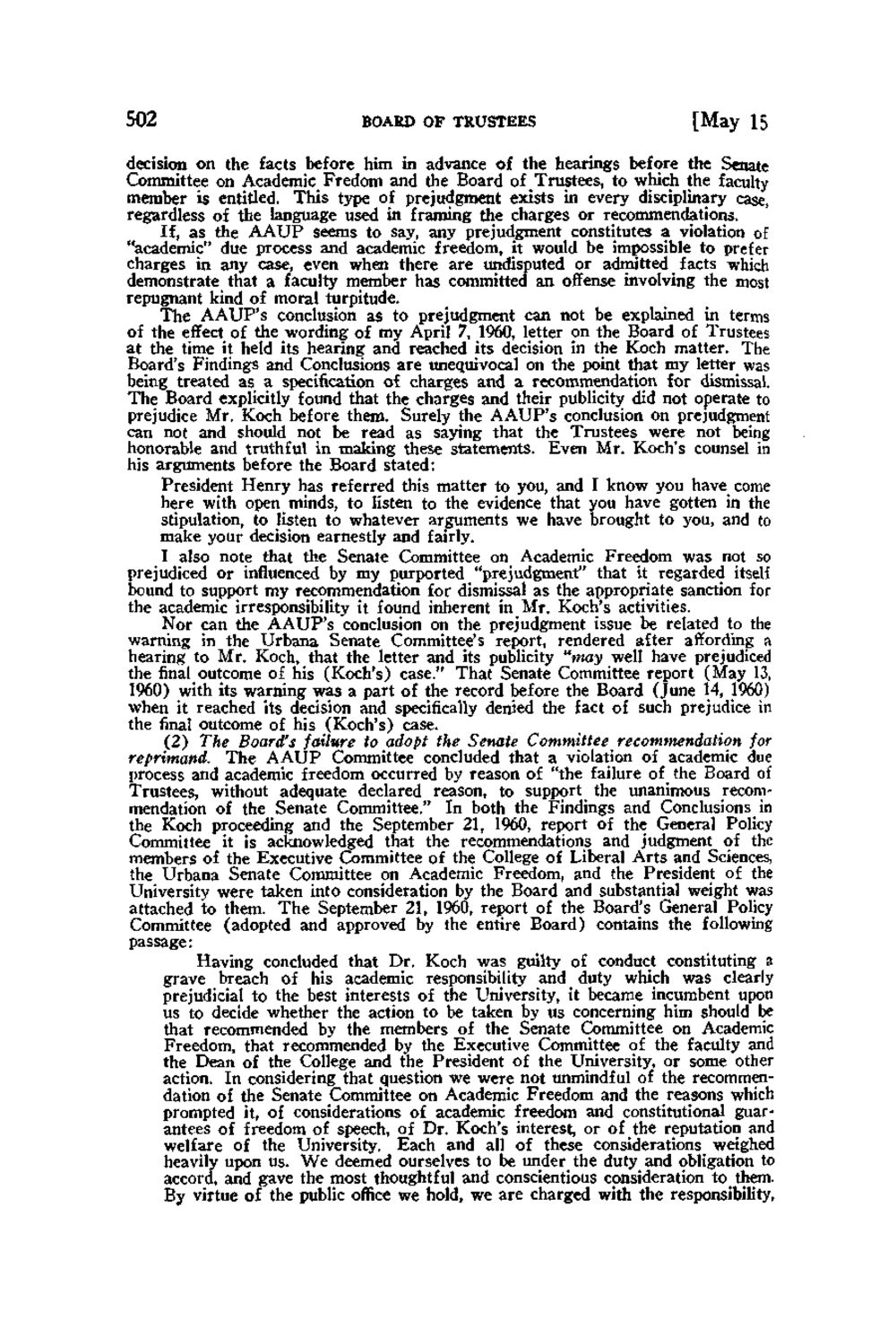| |
| |
Caption: Board of Trustees Minutes - 1964
This is a reduced-resolution page image for fast online browsing.

EXTRACTED TEXT FROM PAGE:
502 BOARD OF TRUSTEES [ M a y 15 decision on the facts before him in advance of the hearings before the Senate Committee on Academic Fredom and the Board of Trustees, to which the faculty member is entitled. This type of prejudgment exists in every disciplinary case, regardless of the language used in framing the charges or recommendations. If, as the A A U P seems to say, any prejudgment constitutes a violation of "academic" due process and academic freedom, it would be impossible to prefer charges in any case, even when there are undisputed or admitted facts which demonstrate that a faculty member has committed an offense involving the most repugnant kind of moral turpitude. The A A U P ' s conclusion as to prejudgment can not be explained in terms of the effect of the wording of my April 7, 1960, letter on the Board of Trustees at the time it held its hearing and reached its decision in the Koch matter. The Board's Findings and Conclusions are unequivocal on the point that my letter was being treated as a specification of charges and a recommendation for dismissal. The Board explicitly found that the charges and their publicity did not operate to prejudice Mr. Koch before them. Surely the A A U P ' s conclusion on prejudgment can not and should not be read as saying that the Trustees were not being honorable and truthful in making these statements. Even Mr. Koch's counsel in his arguments before the Board stated: President Henry has referred this matter to you, and I know you have come here with open minds, to listen to the evidence that you have gotten in the stipulation, to listen to whatever arguments we have brought to you, and to make your decision earnestly and fairly. I also note that the Senate Committee on Academic Freedom was not so prejudiced or influenced by my purported "prejudgment" that it regarded itself bound to support my recommendation for dismissal as the appropriate sanction for the academic irresponsibility it found inherent in Mr. Koch's activities. Nor can the A A U P ' s conclusion on the prejudgment issue be related to the warning in the Urbana Senate Committee's report, rendered after affording a hearing to Mr. Koch, that the letter and its publicity "may well have prejudiced the final outcome of his (Koch's) case." That Senate Committee report (May 13, 1960) with its warning was a part of the record before the Board (June 14, 1960) when it reached its decision and specifically denied the fact of such prejudice in the final outcome of his (Koch's) case. (2) The Board's failure to adopt the Senate Committee recommendation for reprimand. The A A U P Committee concluded that a violation of academic due process and academic freedom occurred by reason of "the failure of the Board of Trustees, without adequate declared reason, to support the unanimous recommendation of the Senate Committee." In both the Findings and Conclusions in the Koch proceeding and the September 21, 1960, report of the General Policy Committee it is acknowledged that the recommendations and judgment of the members of the Executive Committee of the College of Liberal Arts and Sciences, the Urbana Senate Committee on Academic Freedom, and the President of the University were taken into consideration by the Board and substantial weight was attached to them. T h e September 21, 1960, report of the Board's General Policy Committee (adopted and approved by the entire Board) contains the following passage: Having concluded that Dr. Koch was guilty of conduct constituting a grave breach of his academic responsibility and duty which was clearly prejudicial to the best interests of the University, it became incumbent upon us to decide whether the action to be taken by us concerning him should be that recommended by the members of the Senate Committee on Academic Freedom, that recommended by the Executive Committee of the faculty and the Dean of the College and the President of the University, or some other action. In considering that question we were not unmindful of the recommendation of the Senate Committee on Academic Freedom and the reasons which prompted it, of considerations of academic freedom and constitutional guarantees of freedom of speech, of Dr. Koch's interest, or of the reputation and welfare of the University. Each and all of these considerations weighed heavily upon us. W e deemed ourselves to be under the duty and obligation to accord, and gave the most thoughtful and conscientious consideration to them. By virtue of the public office we hold, we are charged with the responsibility,
| |